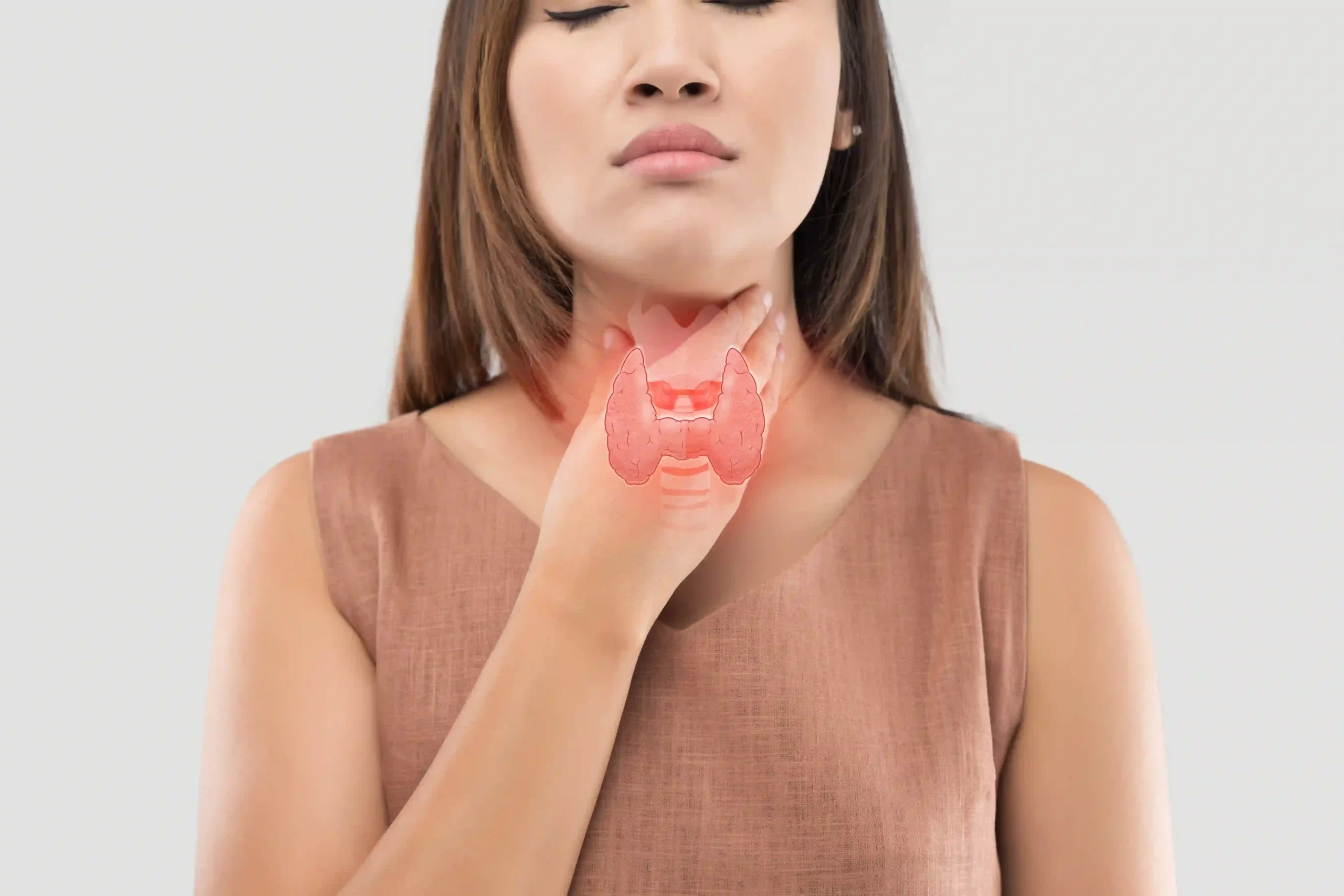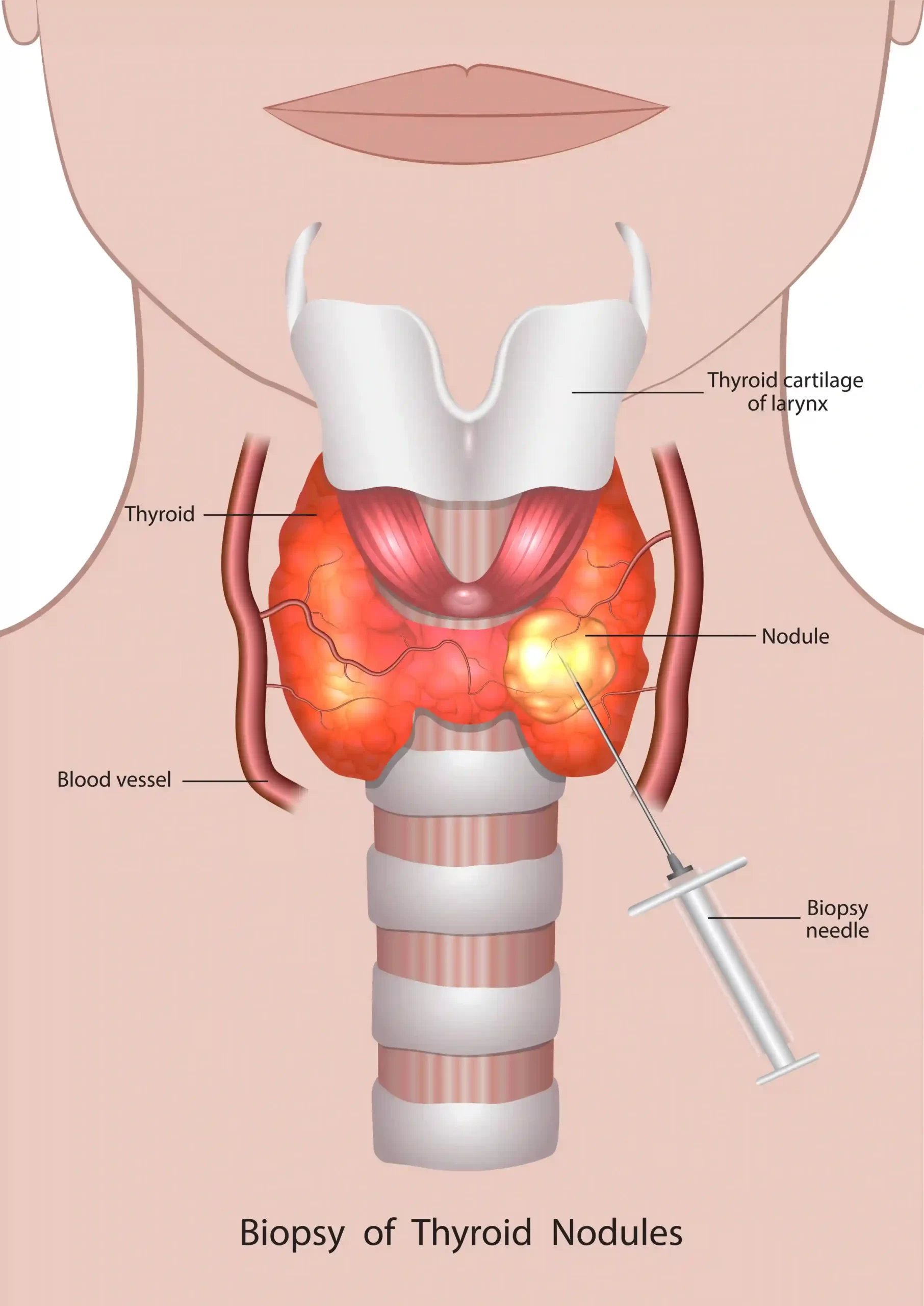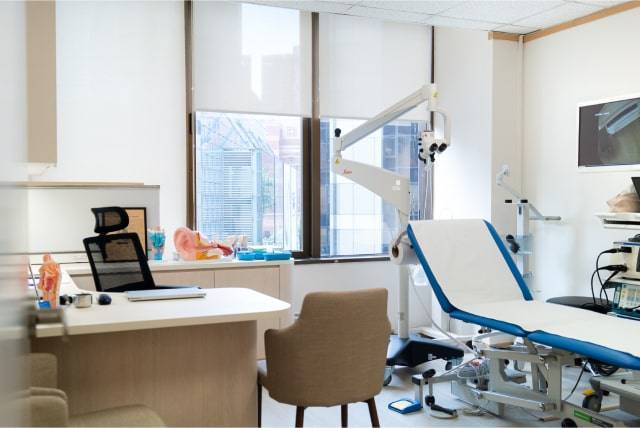Understanding Thyroid Swelling (Nodules)

Thyroid nodules are lumps that commonly arise within an otherwise normal thyroid gland. Often detected by imaging studies or felt as a lump in the throat, most thyroid nodules are benign (non-cancerous) and asymptomatic, but a small percentage can be cancerous or cause thyroid dysfunction.
Understanding the nature, diagnosis, and management of thyroid nodules is crucial, as their presence can significantly impact thyroid function and overall health.
What are Thyroid Nodules?
A thyroid nodule is a growth in the thyroid gland that can, in some cases, be felt as a lump in the neck. The thyroid gland is a butterfly-shaped organ that serves to produce thyroid hormones.
Most thyroid nodules are harmless and cause no symptoms. However, a small percentage can be cancerous, with the potential to spread to other parts of the body, such as the lungs. Hence, patients are encouraged to seek treatment from a thyroid specialist in Singapore to prevent further complications. Typically, thyroid surgery is required to remove cancerous thyroid nodules and prevent their spread.
Notably, thyroid nodules can vary greatly in size and nature. They may be solid or filled with fluid (cystic), and they can occur singly or as multiple nodules within the gland, known as multinodular goitre. Common types of thyroid nodules include:
- Colloid nodules: The most common type of nodules that is due to benign buildups of thyroid cells.
- Thyroid cysts: Fluid-filled sacs inside the thyroid gland that can be either entirely fluid-filled or have solid components. They are rarely cancerous.
- Inflammatory nodules: Develop due to chronic thyroiditis (an inflammation of the thyroid gland), which may or may not be painful.
- Multinodular goitre: An enlarged thyroid gland with multiple nodules and are usually benign.
- Follicular adenomas: Benign tumours that may occasionally lead to hyperthyroidism.
- Thyroid cancer: Although rare, malignant nodules require prompt medical attention.
Patients are often unaware of a thyroid nodule until it is detected during a routine medical check-up or imaging for unrelated health concerns. In more serious cases, a nodule may grow large enough to become visible or cause difficulty with swallowing or breathing.
Symptoms of Thyroid Nodules
Most of the time, a thyroid nodule may not present with obvious symptoms. As such, nodules are often discovered incidentally. However, some nodules may become large enough to be noticeable or cause symptoms such as:
- A visible lump on the neck, especially near the middle of the neck
- A sensation of pressure or tightness in the throat
- Difficulty swallowing or breathing, especially when lying down
- Hoarseness or voice changes
- In some cases, thyroid nodules can produce excessive thyroid hormones, leading to symptoms of an overactive thyroid (hyperthyroidism), such as:
- Unexplained weight loss
- Increased heart rate or palpitations
- Sweating
- Nervousness
- Restlessness or poor sleep
- Diarrhea or increased bowel movement
- Irregular or lighter menstruation
- Older patients may experience fatigue, chest pains and even memory loss.
Causes of Thyroid Nodules
The exact cause of thyroid nodules is often unknown. However, certain factors such as iodine deficiency, radiation exposure, and hereditary conditions may contribute to their development.
In the case of a cancerous thyroid nodule, genetics may play a role, particularly for those with a family history of thyroid cancer. Signs that could suggest a cancerous thyroid nodule include:
- A hard nodule
- A noticeable change in voice
- A nodule is present in those younger than 20 or older than 70
Who is More Prone to Developing Thyroid Nodules?
Thyroid nodules are common and can occur in any age and gender. Benign thyroid nodules are found to be four times more common in females than in males. In contrast, cancerous thyroid nodules are more common in men than women.
Other risk factors that can contribute to thyroid nodules include:
- Increasing age
- History of radiation in the head or neck area
- Family history of thyroid nodules or thyroid cancer
- An existing thyroid condition such as goitre, hypothyroidism, or Hashimoto’s thyroiditis
- Iodine deficiency, which is vital for thyroid hormone production, causes the gland to overcompensate by forming nodules
For those with increased risk, preventing thyroid nodules entirely may not always be possible. You can, however, arrange for regular medical check-ups, which can aid in early detection and management.
How does a Thyroid Specialist in Singapore Diagnose Thyroid Nodules?
In order to obtain a proper diagnosis for thyroid nodules, patients should consult an experienced thyroid specialist in Singapore.

Evaluation of a thyroid nodule will involve a combination of clinical assessment, imaging, and laboratory tests:
- Thyroid Blood Test: Thyroid hormone level in the blood could be indicative of abnormal thyroid function, which could be due to a nodule.
- Thyroid Function Tests: Assess the gland’s hormone production levels to determine if the nodule is affecting thyroid function.
- Ultrasound: A key imaging tool that helps in assessing the size, number, and characteristics of nodules, differentiating between solid and cystic nodules, and identifying features suggestive of malignancy.
- Fine-Needle Aspiration Biopsy (FNAB): A minimally invasive procedure where a thin needle is used to retrieve cells from the nodule. This is the most reliable way to determine if a nodule is benign or malignant.
- Thyroid Scan: Involves the use of radioactive iodine or technetium to evaluate nodule function and is particularly useful for nodules causing hyperthyroidism.
What are the Treatment Options Available for Thyroid Nodules?
At Aglow ENT Centre, our thyroid specialist is also trained to do thyroid surgery in Singapore. Thyroid lump treatment generally depends on their size, type, and whether they produce excess thyroid hormones or are cancerous. Treatments involving the removal of a thyroid nodule generally is dependent on the following factors:
- Whether the nodule is potentially cancerous
- Whether the nodule compromises the patient’s condition, such as causing difficulty swallowing or breathing problems
- Whether the nodule produces excess thyroid hormone, leading to symptoms
In terms of treatment, patients may be prescribed any of the following options depending on their condition:
- Observation: Small, benign nodules that don’t cause symptoms may simply be monitored over time with periodic ultrasounds. This may involve routine checks spaced out over a period of 1- to 5 years.
- Radioactive Iodine: Used to treat nodules that are hyperfunctioning or contribute to hyperthyroidism.
- Ethanol Ablation: Involves injecting alcohol into the nodule to reduce its size, typically used for cystic nodules.
- Surgery: Recommended for nodules that are cancerous, suspected to be cancerous, or cause significant symptoms due to their size. In some cases, benign thyroid nodule treatment may also involve surgery. The extent of surgery can vary from removing a portion of the thyroid (lobectomy) to removing the entire gland (thyroidectomy).
Maintaining a healthy lifestyle and regular monitoring are key components of management for individuals with thyroid nodules. For those with a benign thyroid nodule, a biopsy is recommended 6 to 12 months after diagnosis, especially if the nodule appears to have grown. When necessary, patients should also follow the recommended schedule for ultrasound examinations as advised by their thyroid specialist.
In cases where a patient undergoes surgical thyroid removal or radioactive iodine therapy, potential side effects may include lifelong underactive thyroid function.
When should you see a Thyroid Specialist in Singapore for Thyroid Nodules?
Thyroid nodules are a prevalent condition that can range from benign growths requiring minimal intervention to cancerous nodules needing surgical removal. Early detection and appropriate evaluation are critical to determine the nature of the nodule and guide treatment decisions. With advances in diagnostic techniques and treatment options, most people with thyroid nodules can lead healthy, normal lives. If you discover a lump in your neck or experience symptoms suggestive of a thyroid nodule, it’s important to consult a thyroid specialist for a thorough evaluation and appropriate treatment, such as thyroid surgery in Singapore.
You can schedule a consultation with Dr Ker Liang, an experienced thyroid surgeon in Singapore at Aglow ENT Centre. With more than 14 years of experience in otolaryngology, Dr Ker Liang specialises in treating various head and neck conditions, including the treatment of thyroid nodules.
Frequently Asked Questions
Are thyroid nodules common in children?
Thyroid nodules are less common in children than in adults, but they can still occur. Paediatric cases often require evaluation by a thyroid specialist to ensure appropriate management of their development.
Can thyroid nodules cause changes in menstrual cycles or fertility?
Yes, thyroid nodules that produce excess hormones (hyperthyroidism) can disrupt menstrual cycles and affect fertility. It’s important for women experiencing these symptoms to consult with a thyroid specialist for proper evaluation and management.
What are the potential complications of leaving thyroid nodules untreated?
Untreated thyroid nodules, especially those causing hyperthyroidism, can lead to complications like heart palpitations, irregular heartbeat, and bone thinning (osteoporosis). Regular monitoring and appropriate treatment help prevent these issues.
Is there a link between thyroid nodules and thyroid cancer?
Most thyroid nodules are benign. However, a small percentage can be cancerous. Factors such as family history, radiation exposure, and specific nodule characteristics identified through tests influence the risk. Early detection and proper evaluation are crucial.
What does the treatment for thyroid nodules involve?
Treatment for thyroid nodules depends on several factors, such as size, type, and whether they cause symptoms or are cancerous. Options may include observation, thyroid hormone therapy, radioactive iodine, ethanol ablation, or surgery performed by experienced thyroid specialists.
Can thyroid nodules go away on their own?
There is a possibility that very small and benign nodules may reduce in size on their own.
Why do I feel a mass on my neck?
There can be several reasons for a lump in the neck, including infection or a thyroid nodule. Further evaluation by a thyroid specialist is required to determine the exact cause of the mass.
How do I know if I have thyroid cancer?
You will need to undergo proper diagnostic procedures with a thyroid specialist to test for thyroid cancer.
Are antibiotics sufficient enough to treat thyroid swelling?
Thyroid swelling is not treated with antibiotics, and they are unlikely to be effective.
Can thyroid nodules grow back after thyroidectomy?
It is unlikely for thyroid nodules to grow back after a thyroidectomy.
Assistant Professor Ker Liang has a passion for teaching and is an Assistant Professor with NUS Yong Loo Lin School of Medicine (YLLSOM). As the NUS-NUH Otolaryngology Department Undergraduate Medical Director, Dr Ker Liang supervises the training of medical students from YLLSOM, NUS. She is actively involved
in the training of postgraduate junior doctors and residents in the Head and Neck Surgery department. She was conferred with an Undergraduate Teaching Award by the National University Health System in 2016 for her outstanding efforts as an Otolaryngology educator.
Assistant Professor Ker Liang has a passion for teaching and is an Assistant Professor with NUS Yong Loo Lin School of Medicine (YLLSOM). As the NUS-NUH Otolaryngology Department Undergraduate Medical Director, Dr Ker Liang supervises the training of medical students from YLLSOM, NUS. She is actively involved
in the training of postgraduate junior doctors and residents in the Head and Neck Surgery department. She was conferred with an Undergraduate Teaching Award by the National University Health System in 2016 for her outstanding efforts as an Otolaryngology educator.
Lorem ipsum dolor sit amet, consectetur adipiscing
Lorem ipsum dolor sit amet, consectetur adipiscing elit. Ut elit tellus, luctus nec ullamcorper mattis, pulvinar dapibus leo. Lorem ipsum dolor sit amet, consectetur adipiscing elit. Ut elit tellus, luctus nec ullamcorper mattis, pulvinar dapibus leo.
Lorem ipsum dolor sit amet, consectetur adipiscing
Lorem ipsum dolor sit amet, consectetur adipiscing elit. Ut elit tellus, luctus nec ullamcorper mattis, pulvinar dapibus leo. Lorem ipsum dolor sit amet, consectetur adipiscing elit. Ut elit tellus, luctus nec ullamcorper mattis, pulvinar dapibus leo.
Lorem ipsum dolor sit amet, consectetur adipiscing
Lorem ipsum dolor sit amet, consectetur adipiscing elit. Ut elit tellus, luctus nec ullamcorper mattis, pulvinar dapibus leo. Lorem ipsum dolor sit amet, consectetur adipiscing elit. Ut elit tellus, luctus nec ullamcorper mattis, pulvinar dapibus leo.
Lorem ipsum dolor sit amet, consectetur adipiscing
Lorem ipsum dolor sit amet, consectetur adipiscing elit. Ut elit tellus, luctus nec ullamcorper mattis, pulvinar dapibus leo. Lorem ipsum dolor sit amet, consectetur adipiscing elit. Ut elit tellus, luctus nec ullamcorper mattis, pulvinar dapibus leo.
Lorem ipsum dolor sit amet, consectetur adipiscing
Lorem ipsum dolor sit amet, consectetur adipiscing elit. Ut elit tellus, luctus nec ullamcorper mattis, pulvinar dapibus leo. Lorem ipsum dolor sit amet, consectetur adipiscing elit. Ut elit tellus, luctus nec ullamcorper mattis, pulvinar dapibus leo.



